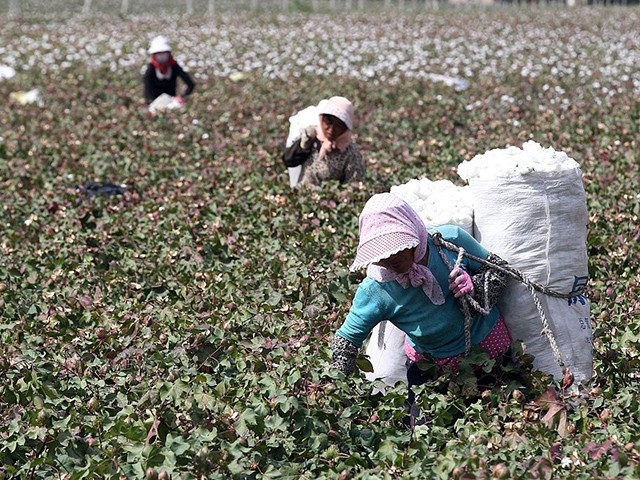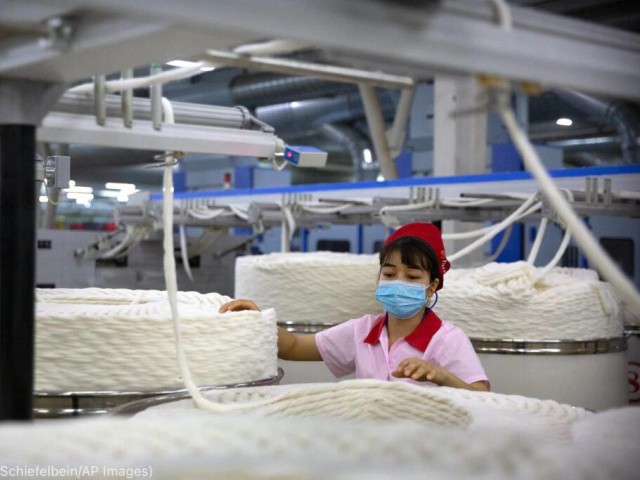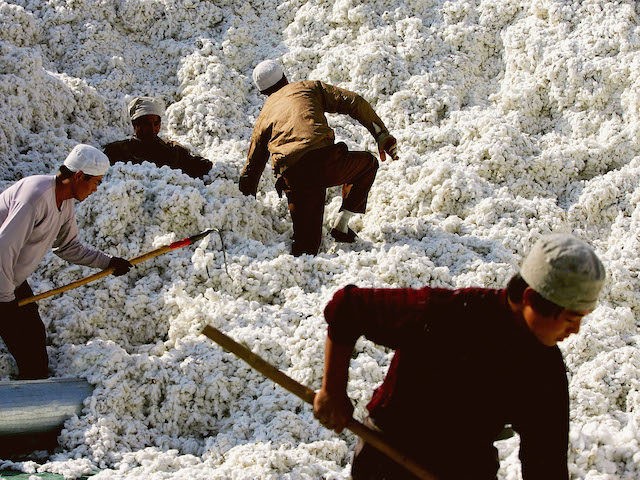Tuesday marked the implementation of the Uyghur Forced Labor Prevention Act (UFLPA), which passed Congress last year and was signed into law by President Joe Biden in December 2021.
The law is expected to deal a major blow to the Chinese cotton and textile industries and perhaps to the wobbling Chinese economy as a whole.
The law establishes a presumption that all products from China’s Xinjiang province are tainted with forced labor, a crime against humanity perpetrated by the Chinese government against the Uyghur Muslims, and bans importing such products into the United States. Importers are required to document their supply chains in detail to prove their components and raw materials were not made with forced labor.
The Uyghur Forced Labor Prevention Act theoretically allows products and materials sourced to Xinjiang, but only if importers can provide “clear and convincing evidence” they were not made or harvested with forced labor – a hurdle Human Rights Watch (HRW) approvingly described as “near impossible” to clear.
“The new U.S. law means it’s no longer business as usual for companies profiting from forced labor in China, and Xinjiang especially. Companies should swiftly identify any supply chain links to Xinjiang and exit the region or risk violating U.S. law and seeing their goods detained at the U.S. border,” HRW senior researcher Jim Wormington said on Monday.
“We are rallying our allies and partners to make global supply chains free from the use of forced labor, to speak out against atrocities in Xinjiang, and to join us in calling on the government of the PRC [People’s Republic of China] to immediately end atrocities and human rights abuses, including forced labor,” Secretary of State Antony Blinken said on Tuesday when announcing the implementation of the UFLPA has begun.
Voice of America News (VOA) noted the new U.S. law predictably “upset the Chinese government,” which insists all accounts of Uyghur oppression are “vicious lies.”
“But the act is also causing concern among some U.S. businesses, which say the federal government has not provided sufficient guidance on steps they must take to avoid having imports seized at the U.S. border,” VOA added.
A common complaint from those business managers and analysts is that supply chains are complicated, and vetting every link in them for products linked to Xinjiang – and then perhaps undertaking the Herculean task of certifying that materials sourced to Xinjiang were not produced with forced labor – will add huge costs to imports at a time when consumers are already reeling from sky-high inflation.

This photo, taken on September 20, 2015, shows Chinese farmers picking cotton in the fields during the harvest season in Hami, in northwest China’s Xinjiang region. (STR/AFP via Getty Images)
“Other third-party certification schemes have been at least partially successful at proving negatives – for instance, that diamonds were not sourced from active conflict zones or mined with forced labor. But those certification schemes typically weren’t being implemented in places like Xinjiang, which is perhaps the world’s most restrictive information environment,” Cullen Hendrix of the Peterson Institute for International Economics pointed out.
Hendrix doubted third-party auditors would be “allowed to do their jobs,” a fair observation given the absolute and unrelenting hostility of the Chinese government to investigations of the Uyghur genocide.
VOA noted U.S. Customs and Border Protection (CBP) issued a pamphlet of “operational guidance for importers” that covered “cotton, tomatoes, and polysilicon used in solar panels,” and some more guidance is expected from the Forced Labor Enforcement Task Force, but many importers will be nervous about complying with the new law. Automakers, in particular, are uneasy about any link of their enormously complicated supply chains that run through Xinjiang.
The fashion industry is also on pins and needles, as the UK Guardian noted on Tuesday that “about 20% of the world’s cotton comes from China, and 84% of that comes from Xinjiang.”
Fashion houses from around the world will be required to certify garments imported to the United States were not made with forced labor – an especially difficult task given that cotton from different sources tends to be mixed together during processing.
Several tech firms are setting up blockchain systems that will help clothing brands provide a “complete digital chain of custody” for their cotton, as TrusTrace chief executive Shameek Ghosh put it.
Optimistic analysts suggested the cost of this secure digital tracing might be offset by increased sales to consumers sensitive about human rights, as a certain cachet will be attached to items certified free of forced labor. Pessimistic analysts wondered how secure the blockchain tracing system will be in practice, as everyone from importers to Chinese agents will have major incentives to manipulate the system.
The South China Morning Post (SCMP) reported on Monday that UFLPA has already “crippled China’s cotton industry” during the 180-day grace period after it was signed into law because “downstream clients” are nervous about getting stuck with tainted cotton that cannot be used in products for the American market.
“Xinjiang cotton used to be the most expensive cotton in the world. Now it has become the cheapest, and still no one buys it,” said a disgruntled Xinjiang cotton mill owner.
“Even though the law targets only Xinjiang, there’s been a domino effect on global supply chains, with shock waves rippling through China’s economy, which is already facing multiple headwinds. Thus, the pain at a single cotton mill in southern Xinjiang is felt across China’s entire textile industry,” the SCMP noted.

A worker watches as a machine processes cotton yarn at a Huafu Fashion plant in Aksu in western China’s Xinjiang Uyghur Autonomous Region on April 20, 2021. (AP Photo/Mark Schiefelbein)
Fortunately for the fashion industry, and unfortunately for China, other countries are ramping up cotton production as they emerge from the Wuhan coronavirus pandemic, so avoiding China entirely is both feasible and cost-effective for international buyers. Chinese companies reported double-digit declines in orders from around the world before UFLPA even went into effect.
“In the textile and apparel export industry, the European and American markets bring considerable profits. If orders from Europe and the American market continue to contract, it means that China’s textile and apparel export enterprises will no longer be profitable,” supply-chain specialist Liu Kaiming told the SCMP.
“It will just result in a growing number of Chinese enterprises reducing their production capacity or even shutting down. This has a huge and terrible impact on China,” Liu predicted.
Chinese Foreign Ministry spokesman Wang Wenbin insisted “the allegation of forced labor in Xinjiang is a huge lie made up by anti-China forces to denigrate China” in his press conference on Tuesday.
Wang said UFLPA is “built on a lie” and an “escalation of U.S. suppression of China under the pretext of human rights.”
“The act is a clear indication that the US is seeking to engender forced unemployment in Xinjiang through legal form of actions, and to make the world decouple with China,” he fumed.

COMMENTS
Please let us know if you're having issues with commenting.